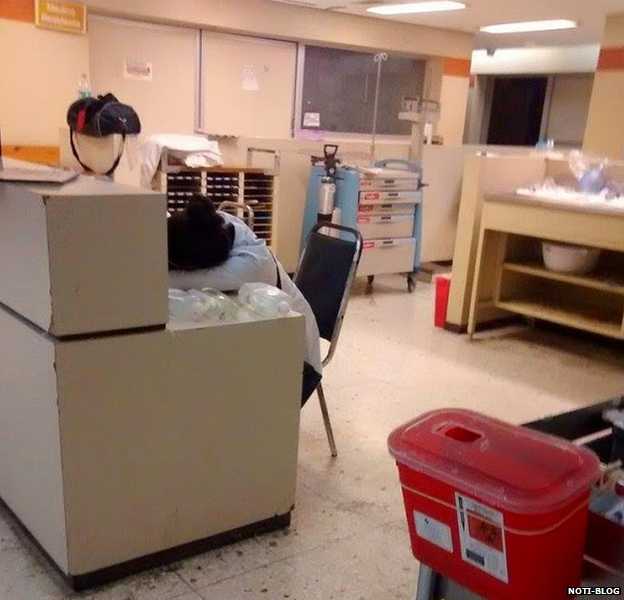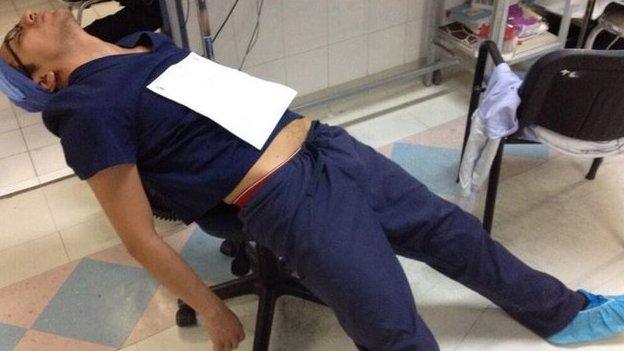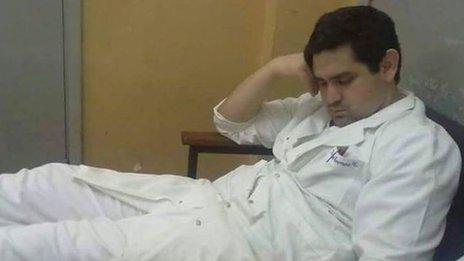Should doctors be allowed to nap on the job?
- Published

This picture of a medical student sleeping on the job caused a stir in Mexico
Are junior doctors overworked? It's a question that's asked in many countries, and in Latin America the debate has been fuelled by photos of a young resident taking a snooze.
It's late, you're exhausted from working all hours at a stressful job, and nobody's around - so you try to grab a few minutes of shut-eye. It's what happened to a young medical resident in Monterrey, Mexico - only she didn't count on a patient spotting her and taking a picture which was then posted online, prompting a huge debate.
"We are aware that this is a tiring job but doctors are obliged to do their work," wrote the blogger, external who posted the images. "There are dozens of patients in need of attention."
It's standard practice for junior doctors in Mexico and most countries in the region to work shifts of up to 36 hours in their final years of training. But the blogger also noted that once a doctor is qualified, they enjoy a good quality of life and a decent salary - well beyond the standard of most of the patients they treat.
But the doctors didn't take the criticism lying down. When Juan Carlos, a Mexican doctor, heard the story, he created the hashtag #YoTambienMeDormi ("I've also fallen asleep") and tweeted:, external "I've also fallen asleep after operating on one, two, three and even four patients on any regular shift." Carlos told BBC Trending that he wanted to "expose the differences between the rights of doctors and the rights of patients."
"As a doctor here in Mexico, it's illegal to take a picture of a patient without their prior consent, even if it's for medical purposes. But a patient can take a photo of a doctor with the sole purpose of damaging our reputation."

One exhausted doctor posted this picture under the hashtag #YoTambienMeDormi
So far, 17,000 people have declared their support for junior doctors on Twitter along with several thousands more on Facebook, and the discussion has grown to include doctors and patients all over the region. Many have posted pictures of themselves or colleagues sleeping on the job to highlight how tiring their work is.
Doctors and young residents commenting on the threads haven't complained much about the length of their shifts, as many accept that this is the best way to develop their medical knowledge and expertise (although European countries have moved to limit the number of hours junior doctors work, external).

A resident student from a hospital in Paraguay found himself in need of a quick nap
The Latin American doctors argue, however, that they're not being treated as humans with "normal physiological needs", says another Mexican doctor, Marcela Cueva. "And that doesn't mean that we don't take good care of our patients. The problem is that nowadays the doctor-patient relationship has been damaged and social media is part of the reason. People are more likely to write when they go through bad experiences rather than good ones."
As for the young resident pictured in the original photo, the hospital in Monterrey confirmed that she was still working there - and that no disciplinary action has been taken against her.
Blog by Gabriela Torres, external
Next story: Mexico's street art revolution
Follow BBC Trending on Twitter @BBCtrending, external, and find us on Facebook, external.